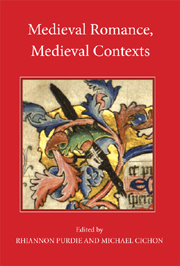Book contents
- Frontmatter
- Contents
- Acknowledgements
- Contributors
- Abbreviations
- Introduction: Romance and its Medieval Contexts
- 1 The Pleasure of Popular Romance: A Prefatory Essay
- 2 Representations of Peasant Speech: Some Literary and Social Contexts for The Taill of Rauf Coilyear
- 3 ‘As ye have brewd, so shal ye drink’: the Proverbial Context of Eger and Grime
- 4 Ekphrasis and Narrative in Emaré and Sir Eglamour of Artois
- 5 What's in a Name? Anglo-Norman Romances or Chansons de geste?
- 6 ‘For Goddes loue, sir, mercy!’: Recontextualising the Modern Critical Text of Floris and Blancheflor
- 7 Roland in England: Contextualising the Middle English Song of Roland
- 8 Romance Baptisms and Theological Contexts in The King of Tars and Sir Ferumbras
- 9 Modern and Medieval Views on Swooning: the Literary and Medical Contexts of Fainting in Romance
- 10 Walking (between) the Lines: Romance as Itinerary/Map
- 11 Romances of Continuity in the English Rous Roll
- 12 ‘Ex Libris domini duncani / Campbell de glenwrquhay/ miles’: The Buik of King Alexander the Conquerour in the household of Sir Duncan Campbell, seventh laird of Glenorchy
- 13 ‘Pur les francs homes amender’: Clerical Authors and the Thirteenth-Century Context of Historical Romance
- Index
- Volumes already published
12 - ‘Ex Libris domini duncani / Campbell de glenwrquhay/ miles’: The Buik of King Alexander the Conquerour in the household of Sir Duncan Campbell, seventh laird of Glenorchy
Published online by Cambridge University Press: 12 September 2012
- Frontmatter
- Contents
- Acknowledgements
- Contributors
- Abbreviations
- Introduction: Romance and its Medieval Contexts
- 1 The Pleasure of Popular Romance: A Prefatory Essay
- 2 Representations of Peasant Speech: Some Literary and Social Contexts for The Taill of Rauf Coilyear
- 3 ‘As ye have brewd, so shal ye drink’: the Proverbial Context of Eger and Grime
- 4 Ekphrasis and Narrative in Emaré and Sir Eglamour of Artois
- 5 What's in a Name? Anglo-Norman Romances or Chansons de geste?
- 6 ‘For Goddes loue, sir, mercy!’: Recontextualising the Modern Critical Text of Floris and Blancheflor
- 7 Roland in England: Contextualising the Middle English Song of Roland
- 8 Romance Baptisms and Theological Contexts in The King of Tars and Sir Ferumbras
- 9 Modern and Medieval Views on Swooning: the Literary and Medical Contexts of Fainting in Romance
- 10 Walking (between) the Lines: Romance as Itinerary/Map
- 11 Romances of Continuity in the English Rous Roll
- 12 ‘Ex Libris domini duncani / Campbell de glenwrquhay/ miles’: The Buik of King Alexander the Conquerour in the household of Sir Duncan Campbell, seventh laird of Glenorchy
- 13 ‘Pur les francs homes amender’: Clerical Authors and the Thirteenth-Century Context of Historical Romance
- Index
- Volumes already published
Summary
The Buik of King Alexander the Conquerour (hereafter BKA) is one of two surviving Older Scots Alexander romances. In a little over nineteen thousand lines, this romance offers a full biography of Alexander's career, conquests and death. It supplements its main source, the second recension of the Latin Historia de Preliis, by drawing not only upon the Old French Roman d'Alexandre, and interpolations to it such as the Voeux du Paon and Voyage au Paradis, but also upon the pseudo-Aristotelian Secreta Secretorum and several pieces of otherwise-independent Older Scots conduct literature.
BKA is extant in British Library Additional MS 40732 (MS A) and National Archives of Scotland MS GD 112/71/9 (MS B). In both, the poem is acephalous. We thus lack its prologue and are forced to rely on the enigmatic final lines (19311–69) for information about its composition. These final lines are not composed by the poem's author, nor simply by a scribe. They are instead written by a redactor, who claims to have rewritten and in the process ‘mendit’ the ‘faltis’ of the ‘noble buike’ (line 19343). He reports that he began this task in the May of 1499 and completed it in August of that year (lines 19354–5). He also provides details of the poem's genesis, informing us that it was ‘translaittit’ ‘out of the Frensche leid’ ‘At þe instance off Lord Erskein, be Schir Gilbert þe Hay’ (lines 19319–20, 19334).
- Type
- Chapter
- Information
- Medieval Romance, Medieval Contexts , pp. 161 - 174Publisher: Boydell & BrewerPrint publication year: 2011

